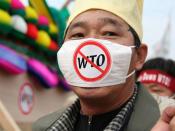The World Trade Organization is an international, multilateral organization setting policies for the global trading system. It settles trade disputes between its member states - one hundred and forty nine in number - and is a successor to the General Agreement on Tariffs and Trade, which was dissolved in the year 1995 to give birth to the World Trade Organization in its stead All of the principles and agreements of the General Agreement on Tariffs and Trade were adopted by the new organization, which added approximately thirty more to them. The new organization stated that its mission is to increase international trade by promoting lower trade barriers. World Trade Organization is also a platform for the negotiation of trade ("World Trade Organization," 2006).
One of the fundamental principles of trading around which the World Trade Organization discussions revolve is that a trading system ought to be more accommodating for poor nations by giving them more time to adjust, greater flexibility, and more privileges.
An open market system is advocated, while it is stressed that a trade system should be free of discrimination. The World Trade Organization is thus a powerful ally for the poor and less developed countries against exploitation from rich and developed nations as well as powerful companies. Some have argued that the World Trade Organization simply serves the interests of the United States and the European Union. Contrary to their opinion, the organization plays a crucial role in controlling a ravenous quest for profits on the part of rich nations and companies (Lipsey, 2006).
Of course, the poor nations are in no condition to impose trade sanctions against developed countries. Disparities do exist. Rich nations are also known to engage in behind the scenes negotiations with the World Trade Organization. Yet, the organization gives a fair...


